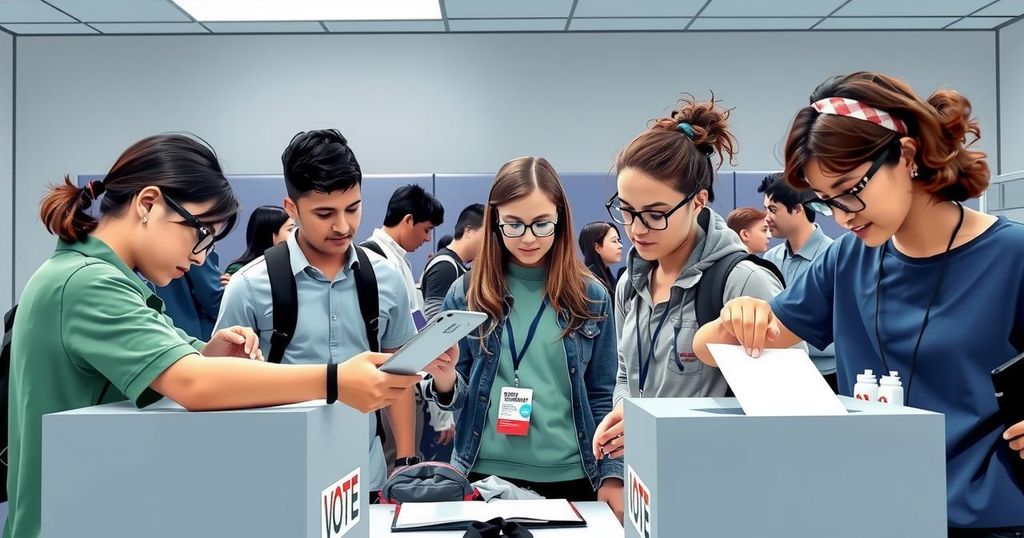CMS High Schoolers Participate in Election for Student Advisor to Board of Education

As early voting proceeds in North Carolina, CMS high schoolers are also participating by voting for the 2025 Student Advisor to the Board of Education. Eight juniors and two sophomores are finalists in the race, with voting running from October 21 to November 5. The role, created to ensure student representation, involves attending board meetings and conveying student concerns. The student advisor role was sought after this year, evidenced by a 59% increase in applications, affirming the importance of student voice in education.
As North Carolina continues its early voting period, the students of Charlotte-Mecklenburg Schools (CMS) are also participating in the democratic process by voting for the 2025 Student Advisor to the Charlotte-Mecklenburg Board of Education. Among the finalists for this position are eight juniors and two sophomores, all of whom are eligible for students in grades nine through twelve to cast their votes from October 21 to November 5, coinciding with the other local and state elections. This Student Advisor role, established in 2016, allows a student to offer feedback during board meetings, representing the concerns of their peers, although they do not possess a formal vote. Additionally, the advisor serves as an officer of the Charlotte-Mecklenburg Youth Council, which collaborates with public entities to convey student perspectives. The forthcoming advisor will hold office for one year, commencing in January 2025. Ailen De Bonis, the current advisor, is a senior at Ardrey Kell High School. This year’s applications for the advisor position saw a noteworthy increase of 59%, rising from 93 applicants in 2023 to 148 in 2024, with students from every comprehensive high school in the district applying for the first time. Dee Rankin, Vice Chair of the Board of Education, emphasized the significance of this role, stating, “The student advisor plays an important role in Board thinking and decisions.” The finalists include: 1. Gabriel Guerra Barceló, Charlotte Engineering Early College: A Venezuelan immigrant advocating for minority student issues and better access to resources. 2. Quinten Canty, West Charlotte High School: A leader focused on amplifying the voices of underrepresented students and fostering their empowerment. 3. Tatiana Collins, Independence High School: Aiming to bridge the gap between students and board decision-making and raise awareness of available resources. 4. Alejandra Flores, Olympic High School: An advocate for creating safer, more inclusive environments within CMS schools. 5. Sydney Glover, Garinger High School: A passionate representative for underserved students, working on improving communication between the board and students. 6. Katelyn Morton, Northwest School for the Arts: Interested in promoting equitable access to educational resources and greater emphasis on the arts. 7. Ngozi Nwauwa, East Mecklenburg High School: Committed to enhancing academic success for all students, especially those with unique learning needs. 8. Lucy Silverstein, Providence High School: Focused on inclusivity for students with learning differences and advocating for mental health resources. 9. Madden Wilkinson, Hopewell High School: Engaging students in board discussions and advocating for improved mental health supports for their peers. This initiative ensures that student voices in CMS are not only heard but also play a vital role in shaping the educational environment and policies in their district.
The Charlotte-Mecklenburg Schools (CMS) system recently initiated a student voting process as part of the election for the Student Advisor to the Board of Education. This program has gained momentum since its inception in 2016, reflecting a commitment to involve students in board discussions and decisions. This election is organized to coincide with broader electoral activities within North Carolina, thus promoting civic engagement among high school students. The surge in applications indicates increased interest and awareness among students regarding their roles and responsibilities in school governance.
In summary, the voting for the Student Advisor role signifies an important step towards integrating student perspectives into the educational decision-making processes within CMS. This not only enhances student engagement but also reflects a growing awareness of the necessity for inclusive representation in educational governance. With diverse finalists focusing on various critical issues, the outcome of this election will potentially contribute to meaningful change in the lives of students across the district.
Original Source: www.charlotteobserver.com







